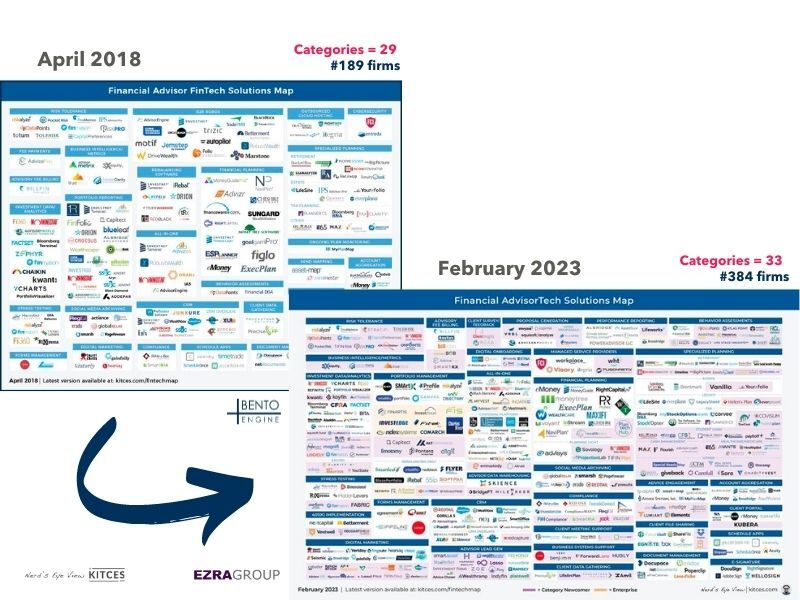

“Overwhelming” … “too many options” … “like a Cheesecake Factory menu.” These are just some of the reactions one hears when discussing Michael Kitces’ ever-popular Financial AdvisorTech Solutions Map. The map showcases firms whose fintech is designed to be used by financial advisors, organizing them into categories such as portfolio management, risk tolerance and financial planning. It’s updated on a monthly basis with help from well-known technology consultant Craig Iskowitz of Ezra Group. As the map approaches its five-year anniversary, having debuted in April of 2018, it’s interesting to reflect on its development over time. The map is representative of the many great innovations taking place in wealth management, and our industry’s overall evolution.
At launch, the map featured 189 fintech companies across 29 categories. As of February, it stands tall at 33 categories and a whopping 384 firms — yes, the number of AdvisorTech solutions available to financial advisors has more than doubled since the map’s inception, in line with the overall fintech boom.

Interestingly, the growth isn’t uniform across the board. There are clearly pockets of the map that are driving — or benefitting from — our industry’s ongoing evolution. Let’s dig into where the expansion is occurring. First off, there’s a "constant core" of evergreen solution categories such as financial planning, account aggregation and risk tolerance that has seen moderate growth of 19%. Then there's a "reclassified core," including many B2B robo-solutions that were emerging in 2018 and subsequently subsumed into the all-in-one and portfolio management categories. This reclassified core has, in aggregate, stayed relatively flat since 2018.
So what’s driving the expansion and influx of fintech companies?
We’ve seen noteworthy growth in two buckets that can be classified as the “growers” and “new kids on the block.” The growers have tripled in size and added a net of 117 firms to the map, spanning seven categories such as CRM, digital marketing and in particular specialized planning. The latter category expanded from 22 firms in April 2018 to 56 in February — clearly an expression of the increased need and opportunity for more advanced and client-segment specific financial planning.
Finally, the new kids have added 72 firms across multiple new categories, including lead generation and the vibrant area known as advice engagement, in which companies are offering new and scalable ways for advisors to engage their clients with personalized financial advice.
Stepping back for a moment to analyze the doubling of firms on the map, in combination with the newer entrants, it’s clear that the AdvisorTech landscape is undergoing a significant shift. In the earlier days of the map, innovation occurred largely in the back- and middle-office areas. However, as the wealth management industry continues to evolve its value proposition, we are witnessing a marked move toward front-office and client-centric solutions.
What’s driving this movement is a broader desire among advisors, and their clients, to move beyond products and toward advice. A new generation of investors is demanding a more personalized experience that transcends traditional service concepts centered on the provision of products. As a recent Vanguard study notes, the advice landscape has changed drastically over the past 15 years and client service has evolved to encompass a more intentional focus on holistic planning, disciplined execution and proactive guidance — not just chasing returns and the potential for outperformance.
Kitces himself affirmed this trend just over a year ago on his blog, noting a shift in “the financial advisor value proposition itself — from the sale of financial services products to the sale of financial advice — which in turn is slowly but steadily reshaping the entire advisor technology stack.” He acknowledges the growing popularity of “advice-support” tools, and the fact that client relationship management systems are increasingly becoming the hub from which client-centric advisors execute their business.
The rapid emergence of new offerings and unique categories is clearly an expression of shifting client preferences and evolving advisor needs. It’s also a testament to the great innovators who are ushering the historically slow-moving wealth management industry into a new era full of choice.
Advisors and their firms are blessed with an abundance of choices today. Like never before, they can tailor their tech stacks to best suit their particular value proposition while supporting their vision of the ideal client experience and optimal advisor workflows. Besides tapping into specialized consultants, there are also some powerful online resources available that can help both advisors and their firms assess and design an optimal future tech stack. These include:
• The Kitces AdvisorTech Directory, which makes the traditional map very searchable and dynamic.
• The Ezra Group WealthTech Integration Score, which helps advisors select technology that integrates well with the rest of their tech stacks.
The map has come a long way since its inception and it will continue its evolution, likely expanding even further over the next five years. Let’s resist the immediate knee-jerk reaction to view that as a bad thing. Instead, let’s celebrate what that truly means — that the financial advice experience is advancing and incorporating fresh approaches, resulting in better technology-enabled experiences for clients and advisors alike.
Philipp Hecker is CEO of Bento Engine, a fintech empowering financial advisors to deliver proactive, comprehensive advice at scale to better serve clients, deepen relationships and convert more prospects faster.

Relationships are key to our business but advisors are often slow to engage in specific activities designed to foster them.

Whichever path you go down, act now while you're still in control.

Pro-bitcoin professionals, however, say the cryptocurrency has ushered in change.

“LPL has evolved significantly over the last decade and still wants to scale up,” says one industry executive.

Survey findings from the Nationwide Retirement Institute offers pearls of planning wisdom from 60- to 65-year-olds, as well as insights into concerns.
Streamline your outreach with Aidentified's AI-driven solutions
This season’s market volatility: Positioning for rate relief, income growth and the AI rebound
